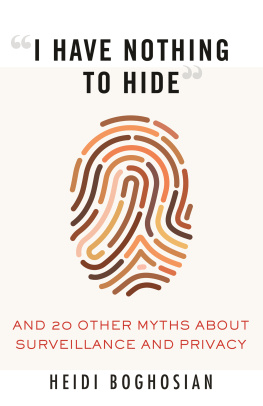Beladi Sara - They know everything about you : how data-collecting corporations and snooping government agencies are destroying democracy
Here you can read online Beladi Sara - They know everything about you : how data-collecting corporations and snooping government agencies are destroying democracy full text of the book (entire story) in english for free. Download pdf and epub, get meaning, cover and reviews about this ebook. City: United States, year: 2015, publisher: Nation Books, genre: Politics. Description of the work, (preface) as well as reviews are available. Best literature library LitArk.com created for fans of good reading and offers a wide selection of genres:
Romance novel
Science fiction
Adventure
Detective
Science
History
Home and family
Prose
Art
Politics
Computer
Non-fiction
Religion
Business
Children
Humor
Choose a favorite category and find really read worthwhile books. Enjoy immersion in the world of imagination, feel the emotions of the characters or learn something new for yourself, make an fascinating discovery.

- Book:They know everything about you : how data-collecting corporations and snooping government agencies are destroying democracy
- Author:
- Publisher:Nation Books
- Genre:
- Year:2015
- City:United States
- Rating:3 / 5
- Favourites:Add to favourites
- Your mark:
They know everything about you : how data-collecting corporations and snooping government agencies are destroying democracy: summary, description and annotation
We offer to read an annotation, description, summary or preface (depends on what the author of the book "They know everything about you : how data-collecting corporations and snooping government agencies are destroying democracy" wrote himself). If you haven't found the necessary information about the book — write in the comments, we will try to find it.
The revelation that the government has access to a vast trove of personal online data demonstrates that we already live in a surveillance society. But the erosion of privacy rights extends far beyond big government. Intelligence agencies such as the NSA and CIA are using Silicon Valley corporate partners as their data spies. Seemingly progressive tech companies are joining forces with snooping government agencies to create a brave new world of wired tyranny.
Life in the digital age poses an unprecedented challenge to our constitutional liberties, which guarantee a wall of privacy between the individual and the government. The basic assumption of democracy requires the ability of the individual to experiment with ideas and associations within a protected zone, as secured by the Constitution. The unobserved moment embodies the most basic of human rights, yet it is being squandered in the name of national security and consumer convenience.
Robert Scheer argues that the information revolution, while a source of public enlightenment, contains the seeds of freedoms destruction in the form of a surveillance state that exceeds the wildest dream of the most ingenious dictator. The technology of surveillance, unless vigorously resisted, represents an existential threat to the liberation of the human spirit.
Beladi Sara: author's other books
Who wrote They know everything about you : how data-collecting corporations and snooping government agencies are destroying democracy? Find out the surname, the name of the author of the book and a list of all author's works by series.







